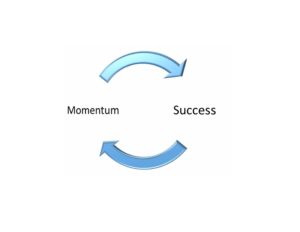Momentum lead to success. Errr, no, wait. Success enhances momentum. No, ugh. Momentum feeds—hmmm…
 Yeah. That’s it. Momentum can lead to success and success builds momentum. Now that I’ve got that straight in my head, I can talk to you about it. Hi there. As we go through this together, know that I’m talking to myself about building momentum as much as I’m talking to you.
Yeah. That’s it. Momentum can lead to success and success builds momentum. Now that I’ve got that straight in my head, I can talk to you about it. Hi there. As we go through this together, know that I’m talking to myself about building momentum as much as I’m talking to you.
Momentum is great when we have it. The words pour out and page after page zips by beneath our fingertips. We finish projects and move on to the next. Each completion feeds our passion, goads us on, pushes us farther. And when that sale happens, holy monkey, it’s like we hit the after-burners. Zoom!
At some point, the glow from the sale begins to fade and though we are still moving forward, our pace slows. Words come harder. It takes longer to finish, if we finish at all. We hit that uphill slog in the manuscript and feel our momentum grinding to a halt like that old, wood-paneled Buick station wagon stalled in the intersection during rush hour.
Have you been there? Drivers navigating around you and showing their appreciation for your delay with a single-finger salute while you desperately crank the key, hoping for a spark to catch. Sometimes it does and, by some automotive miracle, after the tenth crank as the battery is slowly whirring down – ignition! The words come, slowly at first, but they come and we’re on the move again without too much drag on our momentum.
Other times, though, you turn that key, breath held, teeth clenched, and pray to the Buick pantheon for a miracle. Clickclickclick. <insert bad word here>. Dead. Deep breaths. Count to ten. Okay. Gotta get moving again. The ultimate destination of Atlanta sinks beneath the immediate need to get the car to the service station across the intersection.
It’s that change in perspective that’s the key. While we need to keep our ultimate goal in mind, when our momentum slows or stops, we need to set our immediate sights on short-term wins to get moving again. In our unfortunate case here, we need to get out and push this beast out of the traffic flow. Now, a big-ass station wagon doesn’t just move with a body lean. It’s going to take some serious effort to get this thing moving. Feet set, right hand on the steering wheel, left braced against the doorframe, you push. The car leans forward then settles back. Rest for a second. Ready? Eyes on the service station, muscles straining, feet pumping like they did when attacking the sled in high school football practice, the car leans further. Harder. Pushpushpush. The wheel turns. Success! Don’t let up. Pushpushpush. Cross over one lane. Success! The car is rolling freely now. Pushpushpush. Another lane. Steer into the station’s driveway. One final push to get over the storm drain. Pushpushpush. And…success! Now on to the next challenge.
Writing works the same way. We need to plant out butts in the chair and write. It’s going to be hard at first, but stick with it. As we move forward, we need to define our successes in terms that will lift us up and keep us moving forward. As the successes pile up and our progress mounts, we close in on our bigger goals. And when we hit those bigger goals, boom, after-burners.
If your goal is to write a novel. Don’t focus on that one thing, break the effort down into achievable milestones (the first page, the first chapter, the first act, the second act, etc.) and acknowledge the completion of each one. Let that accomplishment propel you toward the next one.
Even backed by a tsunami of momentum, we still have to put our butts in chairs and write. So do it and and use your words to propel your success.



